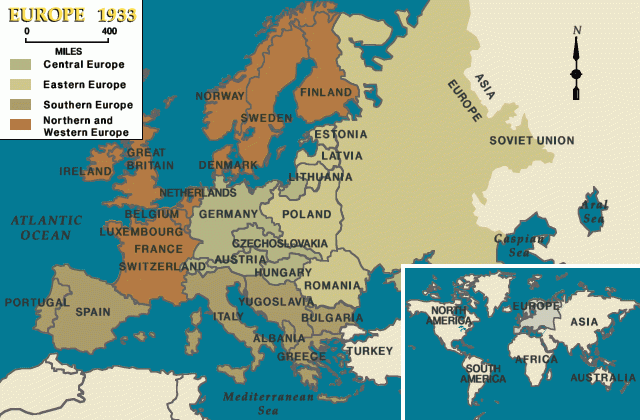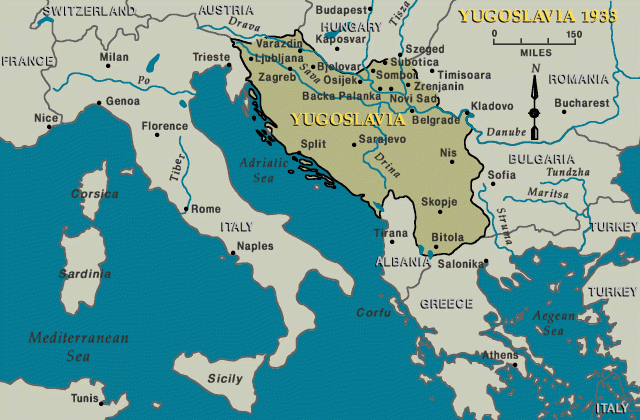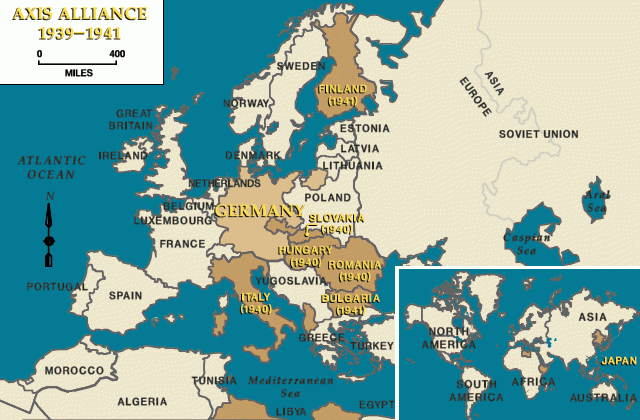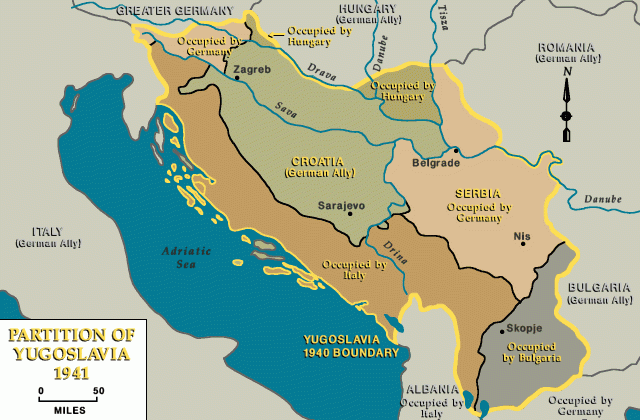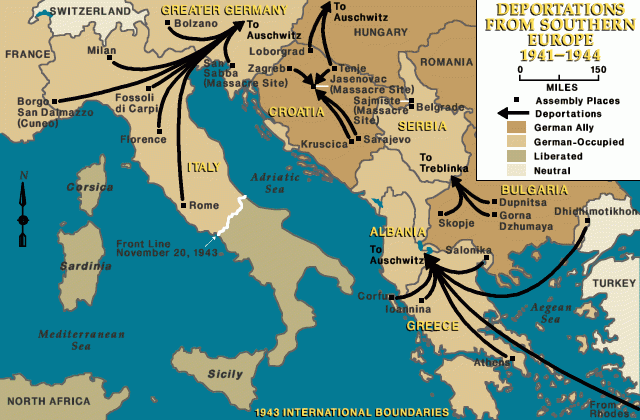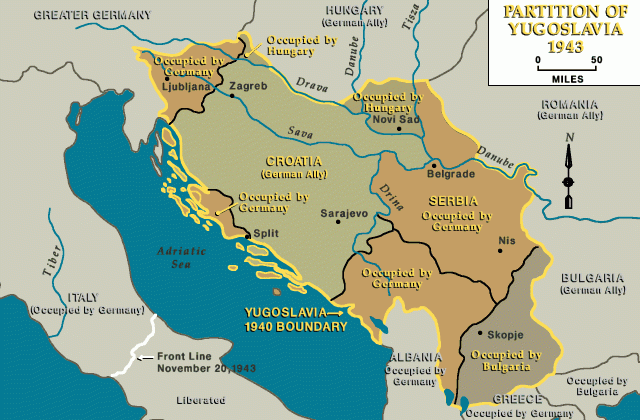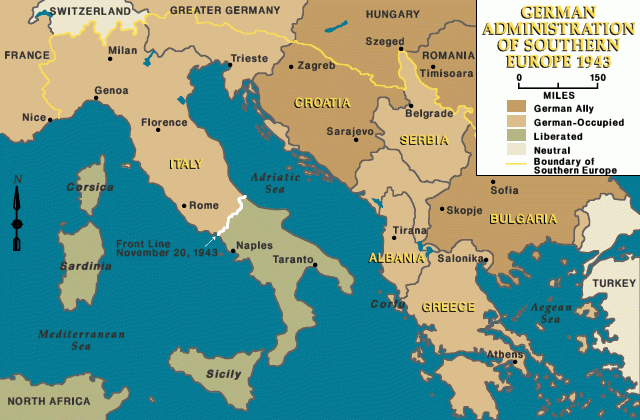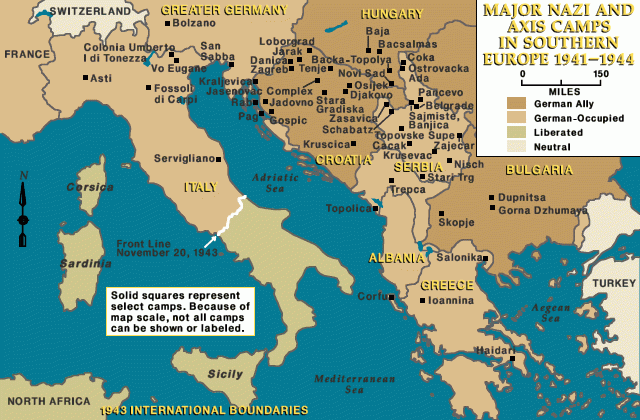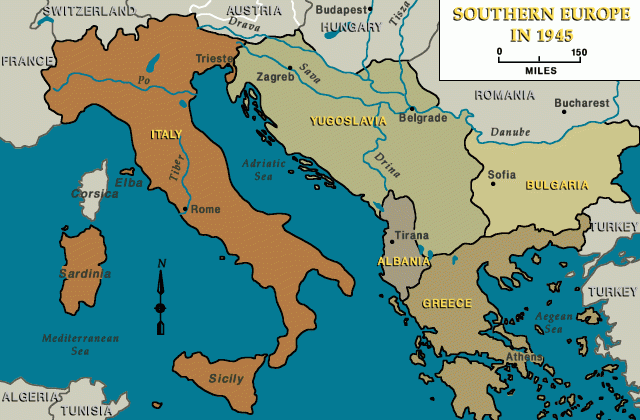Leon Rupnik
During World War II, Slovene general Leon Rupnik collaborated with the forces of Fascist Italy and Nazi Germany. Rupnik was appointed president of the Provincial Government of the German-occupied Province of Ljubljana in 1943. He was convicted of treason and executed in 1946. In 2020, his sentence was annulled on a technicality.
Key Facts
-
1
Leon Rupnik was a former Yugoslav general. He became president of the government in the Province of Ljubljana during World War II.
-
2
Rupnik worked with Italian and German authorities that occupied Ljubljana. Among other efforts, he helped raise Slovene collaborationist police and military forces.
-
3
Rupnik was pro-Nazi and collaborated closely with the German occupation. Since World War II, his supporters and sympathizers have tried to portray him as an independent Slovene nationalist.
Early Life and Military Service in World War I
Rupnik was born on August 10, 1880, in the village of Lokve in present-day Slovenia. This region was then a part of the Austro-Hungarian Empire. He attended the Officer Candidate School in Trieste in 1895 and became an officer in the Austro-Hungarian army. From 1905 to 1907, Rupnik attended the General Staff Academy in Vienna. He was transferred to the general headquarters in 1911, and he rose to the rank of major.
During World War I (1914–1918), Rupnik was stationed at the front in Serbia. He fought in several battles and was recognized for his valor. After Austrian forces occupied Serbia, he was sent to the eastern front. In the summer of 1918, Rupnik became the chief of staff in the Bay of Kotor (Boka Kotorska), where he was in charge of defending South Dalmatia. He remained in service there until the end of World War I.
Military Service in the Kingdom of Yugoslavia
The Kingdom of Serbs, Croats, and Slovenes (later renamed the Kingdom of Yugoslavia) was formed at the end of World War I. At that time, the Austro-Hungarian Empire splintered into several new states. In May 1919, Rupnik became an officer of the Royal Yugoslav Army at the rank of major. He rose through the ranks and became a divisional general in 1937. Rupnik received several decorations in the Yugoslav army.
In 1938, Rupnik became responsible for the construction of Yugoslavia’s defensive fortifications. This system became known as the Rupnik Line. It was located on Yugoslavia’s borders with both Italy and Austria. It was not yet complete when Axis forces invaded Yugoslavia on April 6, 1941.
During the invasion of Yugoslavia, Rupnik was the chief of staff of the 1st Army Group based in Zagreb. He commanded two armies, the 4th and 7th. A day after the invasion began, he ordered a retreat from the frontlines. Axis forces quickly occupied Yugoslavia. Germany and Italy both annexed portions of present-day Slovenia. The Croatian fascist group Ustaše, under the leadership of Ante Pavelić, proclaimed the “Independent State of Croatia,” which was sponsored by Nazi Germany and Fascist Italy. Despite its claim of independence, Croatia was divided by Germany and Italy into zones of influence. Both Axis powers soon stationed troops there.
Pavelić ordered Rupnik to leave Zagreb, and Rupnik settled in the city of Ljubljana. At the time, the city was the capital of the predominantly Slovene region of Yugoslavia annexed by Italy. The region became known as the Province of Ljubljana.
The Province of Ljubljana
Rupnik became the mayor of Ljubljana in June 1942. As mayor, he cooperated fully with the Italian authorities. He helped them incorporate the Province of Ljubljana into Italy. He also worked to build local support for Fascism. Rupnik took part in Italian-sponsored events, gave supportive public speeches, and called on Slovenes to be loyal to Italian authorities. Rupnik also helped Italian authorities organize a local militia by providing them with a list of people to be drafted.
German Occupation of the Province of Ljubljana
Italy surrendered in September 1943 following Allied victories in North Africa and the successful Allied invasion of Sicily in summer 1943. After Italy’s surrender, German forces occupied the Province of Ljubljana. German authorities absorbed the province into the broader administrative district known as the Operational Zone of the Adriatic Littoral. On September 20, 1943, Rupnik was appointed president of the administration of the Province of Ljubljana. His authority derived from the German authorities who had appointed him. Rupnik hoped to create a Slovenian protectorate in a Europe dominated by Nazi Germany. However, German authorities did not commit to this plan.
Rupnik admired Nazi Germany and shared several beliefs with Nazi ideology. He was extremely anticommunist, and he gave many antisemitic speeches. During his presidency, Rupnik continually demonstrated his allegiance to Nazi Germany. He helped support the German occupation authorities in a number of ways. He encouraged people to cooperate with German forces and to turn in resistance fighters. He organized mass rallies that people were forced to attend. Rupnik also mobilized collaborationist military forces, and he reorganized the regional administration and the police.
Rupnik also helped organize a secret political police force. This so-called “Information Bureau” (“Informativni urad”) kept detailed files about individuals’ political sympathies. The Information Bureau worked with other collaborationist police forces. Together, they identified and persecuted people suspected of supporting communist resistance forces. The political police was also connected to the secret organization known as the Black Hand (Črna roka). The Black Hand tortured and killed people believed to be helping the resistance.
Rupnik also organized the Slovene Home Guard (Slovensko domobranstvo – Slowenische Landeswehr) to fight forces that wanted to liberate the territory from German occupiers. The German authorities viewed the Home Guard as auxiliary police units. In the western part of the region, the Home Guard was under the direct command of the Gestapo. At first, Rupnik wanted to require all men of military age to serve in the Home Guard. German authorities wanted service in the Home Guard to be voluntary. A senior SS officer and police general, Erwin Rösener, became the Commander-in-Chief of the Home Guard. Although the Home Guard was firmly under the command of the German occupiers, it had the appearance of an independent Slovene national force. Orders were given in the Slovene language, and Rupnik became the “general inspector”—a largely symbolic position of leadership.
On April 20, 1944—Adolf Hitler's birthday—members of the Home Guard swore to fight communism and the Western Allies. Home Guard units often fought alongside German troops. They turned over any captured Allied pilots or escaped Allied prisoners of war to the German authorities.
Rupnik also helped organize labor to support the German war effort. In autumn 1944, the provincial administration forced hundreds of people of all ages to help build defensive fortifications for the German army.
Destruction of the Jewish Community
Under German occupation and the provincial administration led by Rupnik, the already small Jewish community in the Province of Ljubljana was destroyed. To this day, the exact numbers are unknown.
At the beginning of the Italian occupation, there were around 400 Jews in the Province of Ljubljana. Some were from the region, but many were refugees from Austria, Germany, German-occupied territories, or the Independent State of Croatia. Many tried to flee the region or joined the ranks of the Slovene partisans, led by Yugoslav revolutionary communists. Relatively few Jews stayed until the German occupation in September 1943. After occupying the Province of Ljubljana, German forces rounded up Jews with help from Rupnik's provincial administration, especially the police and the Home Guard. In September 1944, they arrested the remaining Jews in Ljubljana and deported them to Auschwitz, where most of them perished.
Roughly 800 Jews—around 90% of the prewar Jewish population—were killed in the entire area of present-day Slovenia. After Germany occupied the region in September 1943, authorities deported the Jewish population to killing centers. In 1944, following the German occupation of Hungary, German authorities deported Jews from the Prekmurje region of Yugoslavia. This region had been annexed previously by Hungary. With the help of Hungarian forces and local Slovene collaborators, German forces arrested and deported roughly 400 Jewish inhabitants of this region to killing centers. Only 67 Jews from the Prekmurje region are known to have survived.
Efforts to Avoid the Label of Collaboration
As it became clear that the Allied powers were about to win the war, Rupnik and others in his collaborationist administration tried to prepare for the postwar world. In spring 1945, Rupnik and Home Guard leaders created plans for the Home Guard to seize German weapons. They sought to prevent a communist revolution and to secure the region before Allied troops arrived to liberate it. The Home Guard had been formed as an auxiliary force of the Third Reich. Now it planned to declare itself the official army of postwar Slovenia. This was an attempt to shake off the mark of collaboration.
Events quickly outpaced their plans. Just before evacuating the region in early May 1945, German authorities handed power to Rupnik. As German forces were preparing to retreat, Slovene and Yugoslav partisan units were liberating parts of Slovenia. Some Slovene politicians had organized a National Committee for Slovenia that did not support Rupnik. They were planning to push out Rupnik and take control. Realizing that Allied forces would be arriving soon, Rupnik decided to resign and flee with the retreating German forces.
Rupnik fled north to Austria with the German forces and most of the Home Guard. Other collaborators and anticommunists fled with them. After the collapse of Nazi Germany, Rupnik spent a few months in British refugee camps in Austria and Italy. In January 1946, he was transferred into the custody of Yugoslav military authorities.
Postwar Trial
Rupnik stood trial in August 1946 before a Yugoslav military court in Ljubljana. He pleaded guilty to charges of treason and war crimes, but he tried to justify his collaboration by arguing that he had done it for the good of his fellow Slovenes. He was sentenced to death for treason; a petition for clemency was denied. Rupnik was executed by firing squad in Ljubljana on September 2, 1946.
Attempts to Repeal
Decades after Rupnik’s execution, scholars began to question whether the postwar trials of Yugoslav collaborators had been conducted fairly. In the 1990s, Rupnik’s son-in-law published a book in support of Rupnik and his government. Sympathizers and collaborators living abroad portrayed Slovene collaborators of Nazi Germany as independent anticommunist patriots.
In 2014, Rupnik's grandson filed a petition from Argentina that challenged the 1946 verdict against his grandfather. The Supreme Court of the Republic of Slovenia determined that some of the points in the 1946 judgment against Rupnik did not meet the judicial standards of that time. The court repealed the guilty verdict against Rupnik. It referred the case to the District Court of Ljubljana to reach a new judgment. Slovenian law states that the District Court must stop the proceedings if the accused is dead or cannot attend the trial. This effectively means that the accused can no longer be regarded as guilty of the alleged crimes.
Many people interpreted the court’s decision to mean that the Slovenian government was rehabilitating Rupnik and his legacy. Several organizations and individuals protested against the ruling. These included human rights organizations and Holocaust scholars. In Slovenia, several parties filed a motion asking the Constitutional Court to change the Supreme Court's judgment. The motion was filed on behalf of several individuals who had been affected by Rupnik’s policies. Other parties to the motion included the city of Ljubljana, the Jewish community of Slovenia, and a Slovenian veterans organization. They argued that the Supreme Court’s ruling violated their rights as well as the standards of international criminal law. A final decision from the Constitutional Court is pending.
The Supreme Court’s decision means that the legally established guilt of Leon Rupnik is no longer recognized by the court. The 1946 guilty verdict has been annulled. The District Court of Ljubljana is not proceeding with a new trial. This legal uncertainty makes Rupnik’s legacy less clear. If his guilt is not legally re-established, his supporters and apologists could be more likely to try to deny his crimes and rehabilitate his legacy.


